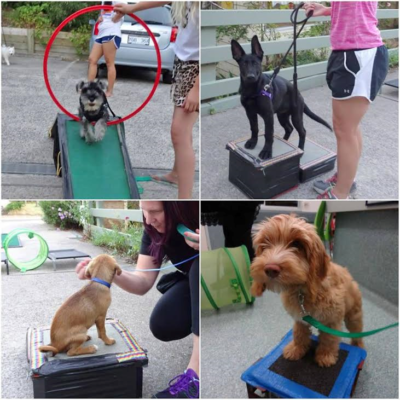Early learning in puppies and red flags for mental health.
When we welcome a dog or pup into our lives, we have certain expectations about how they should behave and fit into our family life. As social creatures able to bond with humans, dogs have co-evolved and shared our lives for thousands of years. However, each pup’s survival within their human family is dependent on them displaying desirable behaviours.

What affects your pup’s behaviour?
The behaviour your pup chooses at any particular moment is affected by their genetic make-up, what they have learned and their current situation or environment.
Genetic make-up is not just about breed. In fact there is more diversity in behaviour between individuals or family lines within a breed than between different breeds.
Learning has a huge impact on the behaviour choices your dog will make and there is so much we can do to teach our pups to grow into ‘good citizens’. We can provide positive opportunities for them to adapt to all the weird and wonderful things in our world and use rewards to help them associate challenging situations with good things.
When does your pup’s mental development start?
From birth to adulthood, you puppy’s brain is undergoing intense development. Even in the womb, a pup’s development can be compromised if their mother is suffering environmental stress.
Right from the beginning, the pup is learning how best to survive in their world. The first hundred days is a crucial period when they will most benefit from positive exposure to the stimuli that make up their world. They must learn how to socialize to other dogs and people in these early weeks to be suitable companions.
In the normal pup, there is a pruning of neurons in the brain over this time that helps reduce overwhelm and over reactive behaviour. This helps them learn what to pay attention to and what they can safely ignore.
A pup’s early experience during the socialising period affects resilience or coping capacity. A small amount of stress like being gently handled is important in developing the ability to bounce back from stress later on. However, if faced with too much stress or too many choices, the pup will turn their attention away from the world around them and shut down to learning about their environment. Pups raised in isolation or impoverished environments are also more susceptible to becoming anxious and need early interventions to help them feel safe in the real world.
At two-three weeks of age, pups benefit from a moderate variety of textures and structures to enrich their environment and promote development.
From three to twelve weeks, pups learn through play about their social structure and natural bite inhibition. They are very receptive to new experiences at this time, rapidly socialising and learning to accept new objects and situations. Introduction to other breeds is important at this stage and puppy preschool is a great opportunity to do this in a controlled way.
A fear period between eight and ten weeks is a time when a traumatic experience can outweigh positive exposure and cause lasting fears, so it is important to provide environmental enrichment without overdoing stressors. Resilience will vary greatly with genetic background, however the trauma of shipping pups to new homes at this age can sometimes result in lasting emotional damage.
Pups left in impoverished environments without the opportunity to explore their world by fourteen to twenty weeks will not voluntarily do so and can become terrified and distressed if forced out of their comfort zone. Early social intervention is essential to help pups develop resilience and normal behaviour.
The age of separation from mum is another important consideration. Pups separated from mum when only 30-40 days old grow up to show more destructive behaviours, barking, fear on walks, reactivity to noises and food/toy possessiveness than pups weaned after two months.
The home environment of the pup can also be a risk factor to puppy mental health with those pups in an enriched home environment generally fairing best.
How do we recognise anxiety in a little pup?
We need to learn to recognise dog body language. Pups that are fearful can show yawning when not tired, panting, ears back and lip licking. They may be withdrawn and non-social or anxious when left alone.
What can be done?
Living with stress has an impact on both mental and physical health. Early intervention is key to helping pups develop the resilience to cope in our world. Identifying problems and early treatment increases the chance of success as pups don’t tend to grow out of fear.
Treatment is divided into environmental management, behaviour modification and in some cases medication. Dog appeasement pheromone can also be helpful to calm these pups.
Diets rich in fish oils (EPA and DHA), taurine, Vitamin E and L-carnitine can assist neuronal development and learning.
Physical and mental stimulation with sensory cues like games to sniff out things and puzzle solving can help to develop cognitive ability and lower reactivity.
We can help pups develop the ability to be calm on cue through rewarding calm behaviour in varied and stimulating environments. Please don’t hesitate to call us on (02) 6230 2223 if you are concerned about your puppy’s development.

